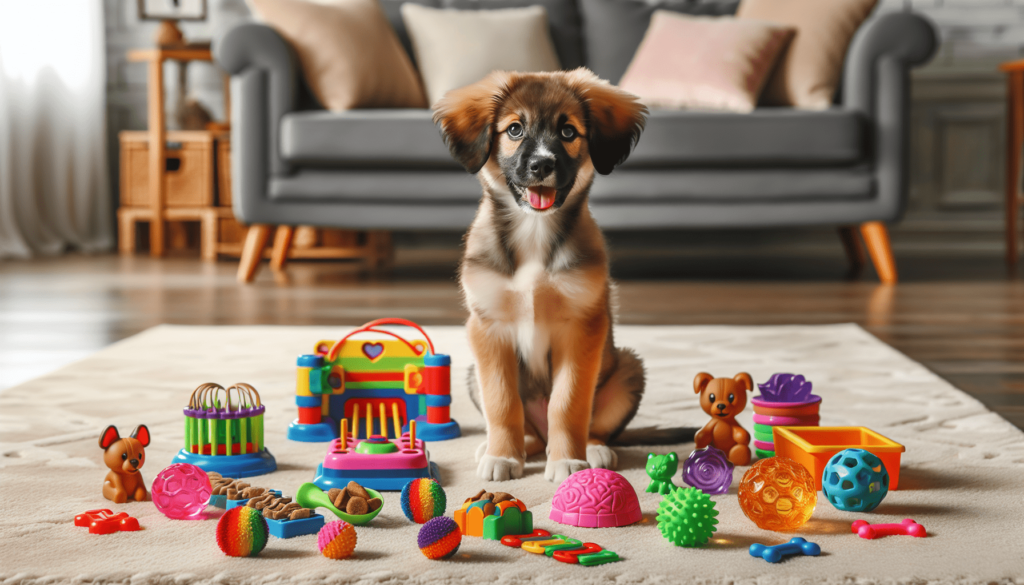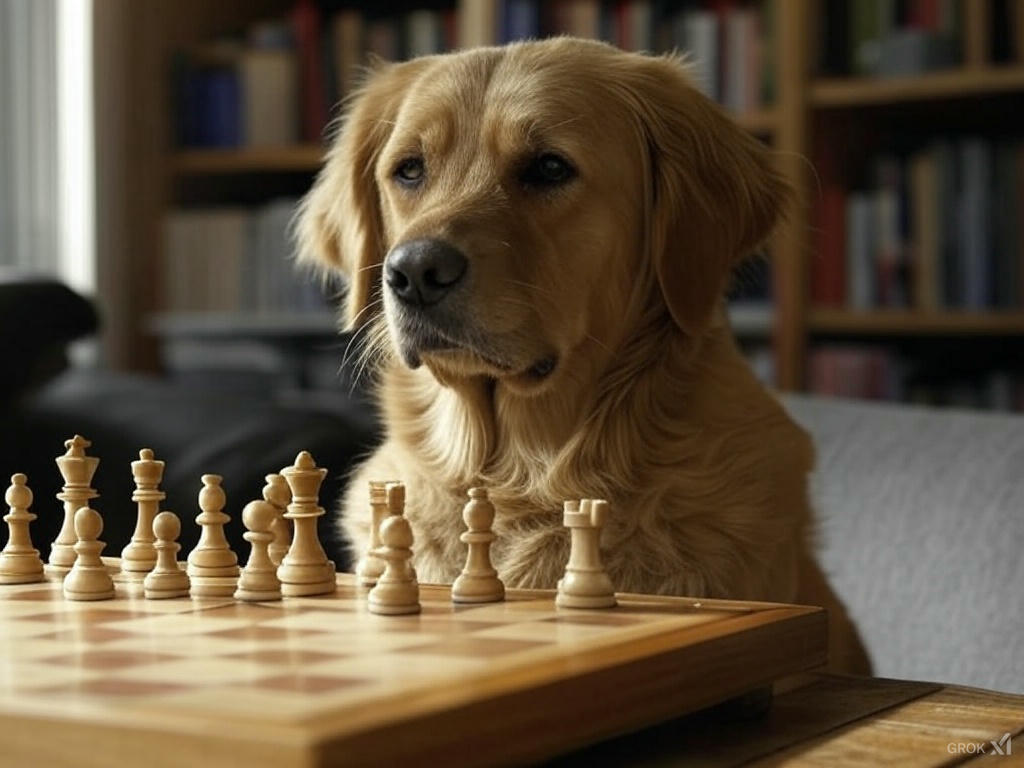Have you ever wondered how you can enhance your puppy’s intelligence while building a stronger bond with them?
Engaging in brain training games is not only fun but also a wonderful way to stimulate your puppy’s mind and ensure they develop into a well-rounded canine companion.
Let’s dive into some effective games and strategies that you can incorporate into your puppy’s routine.
What Are Brain Training Games for Puppies?
Brain training games are activities specifically designed to challenge your puppy’s cognitive abilities.
These games can range from simple tasks to more complex puzzles that encourage problem-solving and critical thinking.
By integrating these activities into your playtime, you’re helping your puppy not just to have fun, but also to learn.
Why Should You Consider Brain Training for Your Puppy?
Playing brain training games is essential because it helps puppies to focus, promotes positive behavior, and reduces boredom.
Puppies that regularly engage in mental stimulation tend to exhibit less destructive behavior and are more adept at learning new commands.
You might find that training sessions become easier and more enjoyable when your puppy is mentally engaged.
How Do Brain Training Games Benefit Your Puppy?
The benefits of engaging in brain training go beyond mere entertainment. Here are a few key advantages to consider:
- Enhanced Problem-Solving Skills: Puppies learn to think critically and develop strategies to solve puzzles.
- Improved Focus and Attention: Your puppy will become more attentive, learning to listen and respond to your commands.
- Increased Bonding Time: These interactive games foster a deeper connection between you and your puppy.
- Less Boredom: Keeping the mind active helps prevent behavioral issues often caused by pent-up energy.
What Types of Brain Training Games Can You Play?
There are various categories of brain training games that can cater to your puppy’s needs. Let’s explore some fun activities you can integrate into your daily routine.
Can You Use Food Puzzle Toys?
Food puzzle toys are a fantastic way to get your puppy engaged in problem-solving.
These toys often come with hidden compartments that allow you to hide treats, prompting your puppy to figure out how to access them.
You can start with easy puzzles and gradually increase the difficulty as your puppy becomes more adept.
- How do you choose the right food puzzle toy? Look for toys that are age-appropriate and match your puppy’s size and chewing habits.
- What are some tips for introducing food puzzles to your puppy? Start by showing them how it works before letting them experiment independently.
Are Hide-and-Seek Games Effective?
Hide-and-seek is a simple yet engaging activity that can teach your puppy to find you or their favorite toys.
You can also hide treats around the house to stimulate their scent tracking abilities.
- How do you play hide-and-seek with your puppy? Start in a small area, allowing your puppy to see you hide. Gradually increase the difficulty by hiding in different locations.
- What skills does this game enhance? It sharpens their ability to track scents and enhances their recalling skills.
Can You Incorporate Trick Training into Brain Games?
Trick training is not just about flashy performances; it’s an excellent mental workout for your puppy.
Teaching them tricks like “roll over” or “play dead” requires concentration and patience.
- How do you effectively teach tricks to your puppy? Break down each trick into small, manageable steps and use positive reinforcement to encourage them.
- What are the best tricks to start with? Simple commands like “sit,” “shake,” and “spin” are great for beginners.
Is Obstacle Course Training Worthwhile?
Creating a DIY obstacle course for your puppy can be both challenging and entertaining.
It can include tunnels, jumps, and weaving stations.
- How do you set up an obstacle course at home? Rearrange furniture or use household items to create a safe and fun environment.
- What are the benefits of this training? It builds confidence and keeps your puppy physically fit, as well as mentally active.

How Can You Make Brain Training Games More Engaging?
You can enhance your puppy’s brain training experience by making it more interactive and fun. Here are some ideas:
Can You Use Positive Reinforcement?
Using treats, praise, and affection as rewards can increase your puppy’s motivation.
Positive reinforcement encourages your puppy to participate enthusiastically.
- How does positive reinforcement work? Rewarding good behaviors makes them more likely to be repeated.
- What are some alternative rewards besides treats? Praise and playtime can also act as effective motivators.
Is It Important to Vary the Games?
Just like humans, puppies can get bored of doing the same activities repeatedly.
Mixing things up keeps them interested and excited.
- How often should you change the games? Every few days or weeks seems like a good rule of thumb.
- What new games can you introduce? Rotating through food puzzles, trick training, and agility courses ensure they’re always challenged.
Can You Keep Sessions Short but Effective?
Puppies typically have short attention spans, so it’s essential to keep training sessions engaging yet concise.
- How long should each training session last? Aim for 5 to 10 minutes for puppies.
- How can you make the most of short sessions? Focus on one skill at a time and use plenty of praise.
What Role Does Social Interaction Play?
Incorporating social elements into brain training can be incredibly beneficial. Group training or playdates with other dogs promotes social skills and cognitive engagement.
- How do social interactions enhance learning? Puppies learn from observing each other, which can make them more adaptable to new commands.
- Can you organize playdates for more social learning? Yes, find friends with puppies and set up playdates that include structured brain games.
What Challenges Might You Encounter?
While training can be a lot of fun, there are challenges that might arise along the way.
How Do You Handle Frustration?
Puppies may get frustrated if they struggle with a task. It’s essential to recognize this and adjust your approach.
- What signs indicate your puppy is frustrated? Signs can include whining, pawing at the toy, or losing interest.
- How can you alleviate their frustration? Simplify the task and provide encouragement.
What If Your Puppy Loses Interest?
If your puppy seems disinterested, it may be time to switch things up. Keeping their engagement high is vital.
- What can you do to reignite their interest? Change the environment, introduce new toys, or play more interactive games.
- How can you tell if a game is too challenging? If your puppy is persistently unsuccessful or seems stressed, it may be time to scale back.
How Do You Deal with Overexcitement?
Sometimes, puppies get overly excited during games, which can lead to chaos instead of focus.
- What signs indicate your puppy is overstimulated? Signs may include excessive barking, jumping, and inability to settle down.
- How can you calm an overstimulated puppy? Take short breaks or switch to quieter activities.
How Can You Measure Your Puppy’s Progress?
Tracking your puppy’s development can be incredibly rewarding. You want to see improvement in their skills and confidence over time.
Are There Specific Milestones to Look for?
Identifying key milestones can help you gauge your puppy’s progress effectively.
- What are some examples of cognitive milestones? These can include improved problem-solving abilities, learning new commands quickly, and being more attentive to your cues.
- How do you record and celebrate their achievements? Keep a journal of new skills learned and celebrate with a special treat or extra playtime.
Can You Create a Training Schedule?
Consistency is crucial in training. Establishing a schedule not only helps maintain regularity but also makes it easier for you and your puppy to bond.
- How do you create a balanced schedule? Include a mix of different games and commands throughout the week.
- What time of day is best for training? It varies, but most puppies are more focused after a short play session or walk.
Should You Involve Other Family Members?
Involving all family members can make training more effective and reinforce consistency.
- How can everyone contribute to the training? Assign roles like preparing food puzzles or leading different games.
- Why is it important for your puppy to learn from various people? It promotes better socialization and adaptability.
How Do You Keep the Fun Going?
Keeping training enjoyable should always be a priority. Here are some suggestions to maintain the enthusiasm.
Can You Rotate Training Methods?
Have you thought about trying different training techniques? Variety keeps the fun alive!
- What kinds of techniques can you incorporate? Consider clicker training, scent work, or new agility exercises.
- How can you find new ideas? Online resources, local training classes, and puppy books can provide fresh inspiration.
Is It Beneficial to Create a Reward System?
Rewarding your puppy for their achievements encourages them to continue engaging in brain games.
- How can you implement a reward system? Keep a chart or use a clicker to mark achievements, rewarding them with treats or extra playtime.
- Do puppies understand rewards? Yes, they link their behavior to the rewards they receive, encouraging them to repeat those actions.
Can You Schedule Regular Brain Training Days?
Setting aside specific days or times dedicated to brain training keeps your puppy on their toes and enthusiastic.
- How often should you schedule these days? Aim for at least once a week but adjust based on your puppy’s energy levels and interest.
- What kind of activities can be included? Mix different types of games and challenges to keep it exciting.
Conclusion
Enhancing your puppy’s intelligence through brain training games is an enriching experience for both you and your furry friend.
From food puzzles to agility courses, the options are virtually endless.
The key is to find what excites your puppy and integrate these activities into your routine.
By playing interactive games, you can increase your puppy’s problem-solving skills, improve focus, and forge a deeper bond.
Remember, patience and positive reinforcement are essential components of effective training.
Don’t hesitate to experiment and vary the activities to keep things fresh and enjoyable.
Next time you’re looking for something to do with your puppy, consider setting up a brain training game.
Your dog will thank you, and you’ll watch them flourish into a brighter, more intelligent companion.
Are you ready to start this exciting journey with your puppy? Get out there and have some fun together!
FAQs
- What age should training games begin?
- You can start brain training games when your puppy is about 8 weeks old.
- How long should each training session last?
- Aim for 5 to 10 minutes, as puppies have short attention spans.
- What are some common signs of frustration in puppies?
- Whining, pawing at toys, or losing interest can indicate frustration.
- Are there specific toys recommended for brain training?
- Yes, look for food puzzle toys, interactive games, and scent-detecting toys.
- How often should I change the training games?
- Every few days or once a week should be sufficient to keep things interesting.
- How can I calm an overstimulated puppy during training?
- Offer short breaks or switch to quieter activities.
- Can trick training be part of brain games?
- Absolutely! Teaching tricks is a fun and mentally stimulating activity.
- How can I involve my family in puppy training?
- Assign various roles, such as preparing puzzles or leading games.
- What’s the best way to reward my puppy for achievements?
- Use treats, verbal praise, or extra playtime as a reward system.
- Should I consult a professional trainer?
- If you are unsure about techniques or facing challenges, a trainer can offer expert advice.
Engaging your puppy with brain training games will lead to an enjoyable adventure that benefits both of you!
